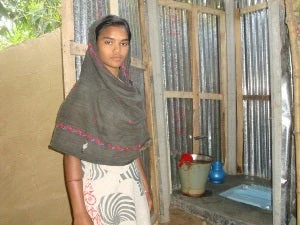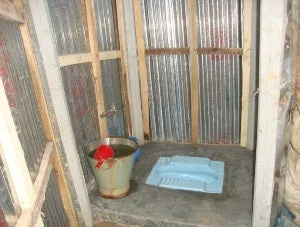The author captured the story of Loyabi, in Chhaor Union Parishad. This is her story of how she provided her family with access to better 
“I will teach my children how to read and write regardless of my difficulties in doing so.”
My name is Loyabi and I come from a very poor family of Mahadanga village in Chhaor Union Parishad. I was married to Abul Hassan, a man from my own village, at the age of 15. For several years our poverty did not prevent us from being happy. We were blessed with two daughters and two sons. However, when my husband was diagnosed with gallstones, I found I had to raise Taka 50,000/- ($630) for his operation.
We had no land of our own and lived on common land. I was able to collect some money by asking for assistance in different villages. I worked as a mid-wife for humans as well as cattle, bathed dead bodies before their burial and somehow put together the required amount of money to get my husband’s operation done.
Hygiene and modesty at stake: The lack of any kind of toilet facility within the house was proving very vexing for us, especially my elder daughter Mariam who studies in Class IX. She would get very embarrassed at having to go into the fields or behind bushes to answer nature’s call. There is always a fear of someone being able to see you.
With both hygiene and modesty at stake, she would often wish she did not need to go to the toilet after returning from school. Mariam keenly desired that we had our own private sanitary facility within the house. She spoke in glowing terms of the cleanliness of her school’s toilet where she claimed you could even dine!
One day Mariam returned from school — Mahadanga Uchcho Vidyalaya — and informed me excitedly that a sanitation committee has been organized in the village to help the ultra-poor and the impoverished to build hygienic water systems like protected hand pumps and sanitary toilets in their homes. This was part of initiative of Union Parishad with support from an NGO.
Fortune favors the brave: Upon enquiry I found that the committee’s chairman is Mr. Mohammad Kausar. I met him to request that a hygienic toilet be installed in my home. He told me that I would need to deposit Taka 692 ($9) with the Union Parishad after which I would be sanctioned a sanitary system in the house. Accordingly, I filed a petition and deposited the requisite money which I had saved from my earnings from deliveries.
There were many job’s comforters who assured me that my money would be swindled and that nothing would come of my efforts. However, work on the sanitary system began after 10 days with workers first digging the pit and other materials arriving at my house. The construction of a simple latrine was completed in four days. However, the children felt that it would be better if it was a ceramic squatting pan instead of plastic pan. It was a serious concern as to where I would be able to find that much money.
As luck would have it, I was called for a delivery that very day. After the delivery, the family wanted to give me an expensive saree. I requested that they give me money instead. They gave me Taka 500/- ($6.30) cheerfully. I added Taka 100/- ($1.26) to that and brought home a ceramic squatting pan. I asked the workers to utilize the remaining rubble and concrete to make the slab for the pan. They did so happily after getting the sanction for it from the contractor Janab Moti-ur-Rahman.
I could not study due to the poverty of my family. This lack of training often poses challenges for me during complications in deliveries. I am unable to get any kind of training to make my midwifery more scientific and safer. I am determined that my children be properly educated, no matter what the difficulties.
Author’s Note: This might have been a small step, but it was a step in the right direction in ensuring a hygienic latrine for every household in Bangladesh, reinforcing the principle of peer learning. The World Bank Water and Sanitation Program with other partners support an initiative led by Union Parishads and launched by the Local Government Division (LGD) of Government of Bangladesh (GoB), called the Horizontal Learning Program. It aims at inspiring everyone to share their good practices with others to build development. In Loyabi's case, one lady’s success inspired her peers to install hygienic sanitary systems in their households. It is a classic case of people adding their own resources to those of projects which can ensure the sustainability of these projects in the long run.


Join the Conversation